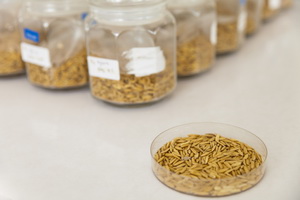
Rice with Triple-stack Traits Shows Better Yields Amidst Abiotic Stresses
May 9, 2018| |
 Field trials of multiple rice lines carrying the nitrogen use efficiency (NUE), water use efficiency, and salinity tolerance traits show significant increase in yields by up to 50 percent compared to control under various abiotic stresses. The rice lines with triple-stack trait was developed by Arcadia Biosciences and the field trials were conducted by experts from the International Center for Tropical Agriculture (CIAT) under the Nitrogen-Use Efficient, Water-Use Efficient and Salt-Tolerant Rice (NEWEST) project, coordinated by the African Agricultural Technology Foundation, and sponsored by the Feed the Future initiative of USAID.
Field trials of multiple rice lines carrying the nitrogen use efficiency (NUE), water use efficiency, and salinity tolerance traits show significant increase in yields by up to 50 percent compared to control under various abiotic stresses. The rice lines with triple-stack trait was developed by Arcadia Biosciences and the field trials were conducted by experts from the International Center for Tropical Agriculture (CIAT) under the Nitrogen-Use Efficient, Water-Use Efficient and Salt-Tolerant Rice (NEWEST) project, coordinated by the African Agricultural Technology Foundation, and sponsored by the Feed the Future initiative of USAID.
Under limiting nitrogen applications, the triple-stack rice lines outperformed the control by an average of 25%, with the lead line yielding up to 33% more. The same lines produced an average of 40% more than controls under limiting nitrogen and drought conditions in the field, with the lead line producing 50% more yield.
Based on the previous field trials conducted in California by Arcadia, triple-stacking the traits in rice has the potential to contribute towards food security. The latest data from the field trials conducted by CIAT shows that there may be synergistic effects between traits that protect crops against abiotic stresses.
For more details, read the news release from Arcadia.
| |
Biotech Updates is a weekly newsletter of ISAAA, a not-for-profit organization. It is distributed for free to over 22,000 subscribers worldwide to inform them about the key developments in biosciences, especially in biotechnology. Your support will help us in our mission to feed the world with knowledge. You can help by donating as little as $10.
-
See more articles:
-
News from Around the World
- Advances in Crop Science Critical in Combating Effects of Climate Change
- New Sunflower Seeds Improve Yields in Tanzania
- Scientists Publish New Model for Communication in Plant Cells
- USDA Proposes New National Bioengineered Food Disclosure Standard
- Rice with Triple-stack Traits Shows Better Yields Amidst Abiotic Stresses
- Radiocarbon-based Study Suggests Wheat Introduced to China in 2600 BCE
- Australian OGTR Invites Comments on GM Wheat Field Trial
- Biotech Experts Push Forward Bill on Modern Biotech in PH
- New Analysis Reveals Organic Agriculture Less Productive than Conventional Agriculture
-
Research Highlights
- Scientists Reveal that a MAPK Signaling Pathway Controls Grain Size
- SlbZIP1 Regulates Biotic and Abiotic Stress Tolerance in Tomato
- Overexpression of Arabidopsis Gene Enhances Vitamin B6 Content in Potato
-
Beyond Crop Biotech
- Rose Genome Provides New Insights into the Domestication of Modern Roses
-
Announcements
- Asian Short Course on Agri-biotechnology, Biosafety Regulation, and Communication
-
Plant
- CRISPR- Mediated Mutagenesis on Duplicated Loci in Soybean
- CRISPR-Cas9 System Used to Develop Pink Tomatoes
- Rapeseed with Increased Oleic Acid Generated through CRISPR
- Research Team Combines Microspore Technology with CRISPR-Cas9
-
Read the latest: - Biotech Updates (February 11, 2026)
- Gene Editing Supplement (January 28, 2026)
- Gene Drive Supplement (February 22, 2023)
-
Subscribe to BU: - Share
- Tweet
